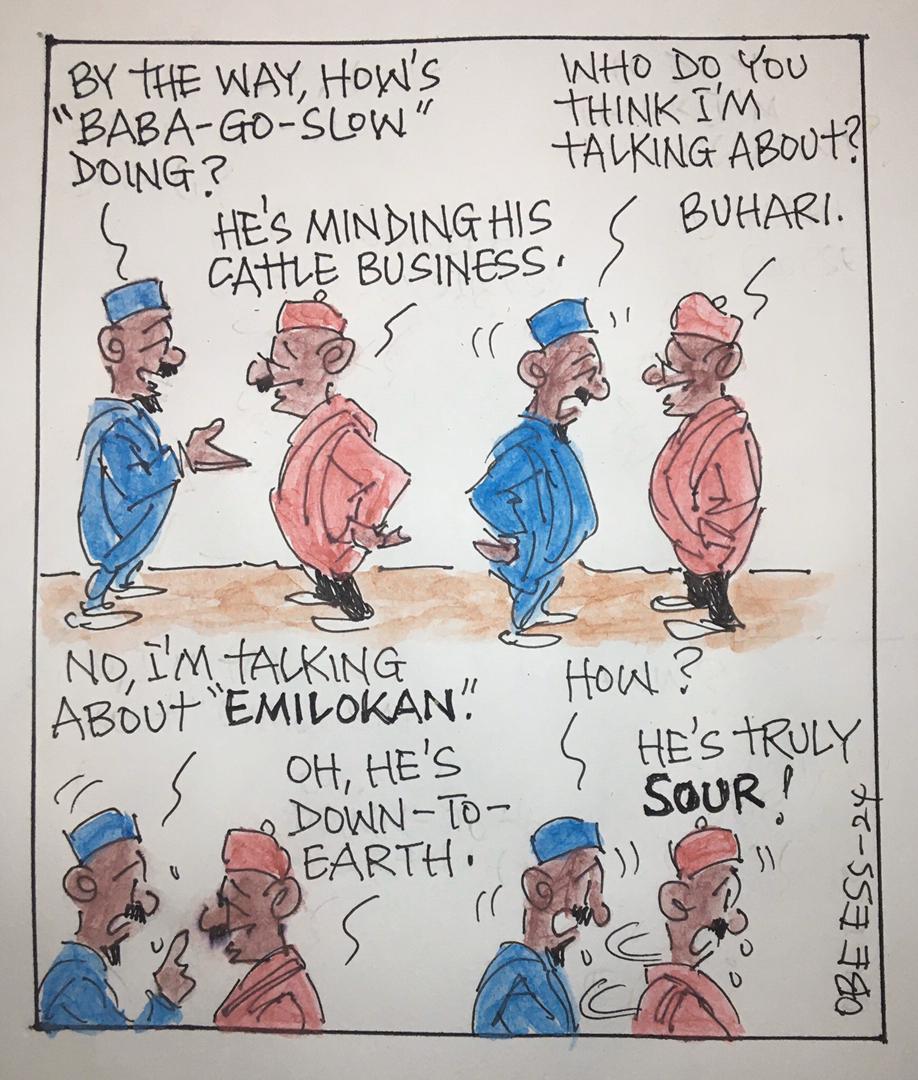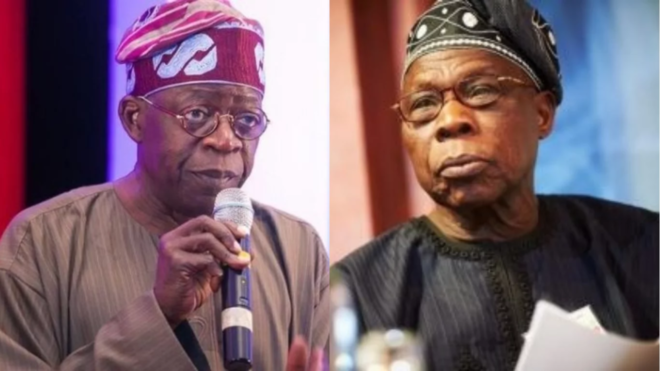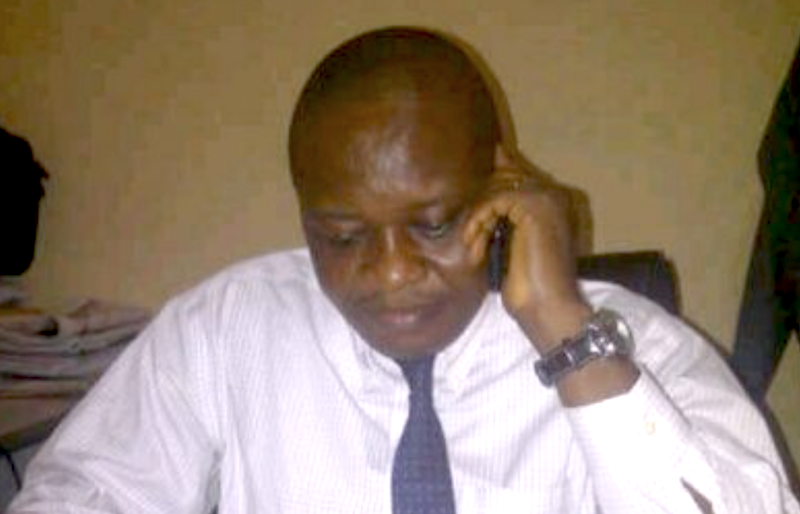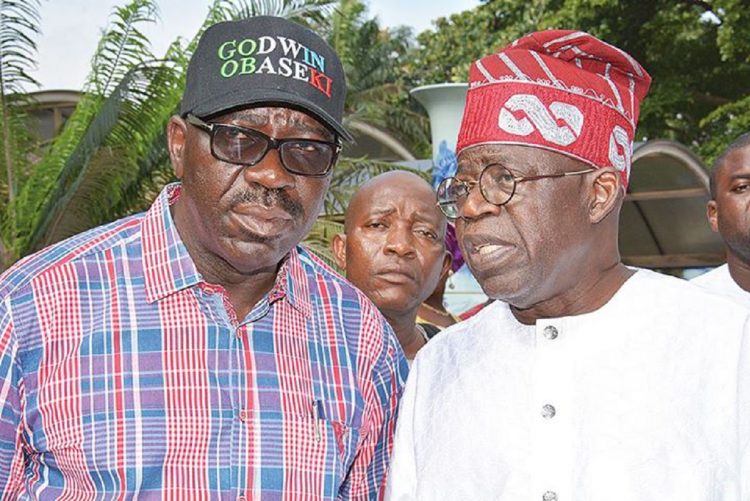
Tag: emilokan
-

Obasanjo slams Tinubu, says “your Baba-Go-Slow ‘Emilokan’ reign has made Nig a failed state
Former President Olusegun Obasanjo has lamented that Nigeria’s current economic situation is very bad and that the situation is made worse by the unwillingness of the leaders to take responsibility.
Obasanjo made this declaration in his keynote address at the Chinua Achebe Leadership Forum, held on Saturday at Yale University in New Haven, Connecticut, USA.
In his speech, titled: “Leadership Failure and State Capture in Nigeria,” he expressed concern over the country’s dire situation, noting, “as the world can see and understand, Nigeria’s situation is bad.”
Using Singapore as an example of a country with effective leadership, Obasanjo highlighted how the government there has remained responsive to the evolving needs of its citizens, making significant investments in sectors like healthcare, education, and social welfare.
He said, “Nigeria’s situation, as we can see and understand, is bad. The more the immorality and corruption of a nation, the more the nation sinks into chaos, insecurity, conflict, discord, division, disunity, depression, youth restiveness, confusion, violence, and underdevelopment.
“That’s the situation mostly in Nigeria in the reign of Baba-go-slow and Emilokan. The failing state status of Nigeria is confirmed and glaringly indicated and manifested for every honest person to see through the consequences of the level of our pervasive corruption, mediocrity, immorality, misconduct, mismanagement, perversion, injustice, incompetence and all other forms of iniquity. But yes, there is hope.”
The former President, while quoting from a short, classic treatise published in 1983 called, “The Trouble with Nigeria” by Chinua Achebe, said, “The trouble with Nigeria is simply and squarely a failure of leadership.
The Nigerian problem is the unwillingness or inability of its leaders to rise to the responsibility, to the challenge of personal example which are the hallmarks of true leadership.”
According to him, two prominent US intellectuals, Robert Rotberg and John Campbell, had once raised the alarm about the failing status of Nigeria and its inevitable effects on the African continent given the country’s size, economic viability, and population, among others.
He described state capture “as one of the most pervasive forms of corruption, a situation where powerful individuals, institutions, companies, or groups within or outside a country use corruption to shape a nation’s policies, legal environment, and economy, to benefit their own private interests.
“State capture is not always overt and obvious. It can also arise from the more subtle close alignment of interests between specific business and political elites through family ties, friendships, and the intertwined ownership of economic assets.
“What is happening in Nigeria – right before our eyes – is state capture: The purchase of National assets by political elites – and their family members – at bargain prices, the allocation of national resources – minerals, land, and even human resources – to local, regional, and international actors. It must be prohibited and prevented through local and international laws.
“Public institutions such as the legislature, the executive, the judiciary, and regulatory agencies both at the federal and local levels are subject to capture.
“As such, state capture can broadly be understood as the disproportionate and unregulated influence of interest groups or decision-making processes where special interest groups manage to bend state laws, policies, and regulations.
“They do so through practices such as illicit contributions paid by private interests to political parties, and for election campaigns, vote-buying, buying of presidential decrees or court decisions, as well as through illegitimate lobbying and revolving door appointments.
“The main risk of state capture is that decisions no longer take into consideration the public interest but instead favour a specific special interest group or individual.
“Laws, policies, and regulations are designed to benefit a specific interest group, oftentimes to the detriment of smaller firms and groups and society in general.
“State capture can seriously affect economic development, regulatory quality, the provision of public services, quality of education and health services, infrastructure decisions, and even the environment and public health.”
-

Democratising ‘Emilokan’ – By Pius Mordi
By Pius Mordi
They called themselves ‘The Reformers’. By their reckoning, they represent a radical thinking in the search for a political and federal arrangement that will suit Nigeria. On Monday, June 10, the 35 federal lawmakers across party lines and regions unveiled their vision for a new political structure for Nigeria.
Ikenga Ugochinyere, the group’s lead speaker, painted the picture of an unprecedented coalition of lawmakers across parties and regions to unfurl an initiative that will “lead to a reduction in the cost of governance”, “unite the country and ensure a seamless transition and unprecedented development for the country”. These are high sounding expectations. But their road map to achieving the goals mainly revolve around reforming access to power by the political class. From Aso Rock to the 36 Government Houses in the states and reform of the electoral process as well as the status of local government areas, the Reformers reeled out a rash of bills they say will be tabled for review of the constitution.
However, their enthusiasm was not matched by their knowledge of the fundamental challenges facing the country and the primary expectations of the people. Their major recipe is a recommendation that occupiers of executive offices should be restricted to just term that will be elongated to six years. By their thinking, governance suffers when a president and governors have to go through the throes of reelection. The problem is that it us built on the esoteric assumption that every president and governor ones voted into office is competent, capable and will play by the rules.
As wide ranging as the bills they propose are, the package has a fundamental flaw. It is not bold and majors in ephemeral issues that do not address the issues that have been stultifying Nigeria’s development. Recommending the zoning of the presidency among the six zones is a product of the wrong assumption that equitable access to power is the major challenge to development in the nation. Apparently, the group aligned itself with the position of former vice president, late Dr. Alex Ekwueme, who came up with the idea of six regions and rotation of the presidency between the north and south. When Ekwueme sold the idea, it seemed plausible at the time. But after 25 years of the Fourth Republic during which the principles of equity, fairness and rule of law were willfully trampled upon and a reign of multi-dimensional poverty and mutual suspicion took root, the path to nationhood no longer lies with merely democratising the “Emilokan” mantra. Each region will be embroiled in jostling for whose turn it will be to have its man in Aso Rock.
The concentration of enormous powers in Abuja under the 1999 constitution has proved to be the major impediment to progress and development. With up 66 items on the Legislative List reserved for Aso Rock, advancement both in the political and economic spheres has been stunted given the absence of innovation and healthy competition. Abuja has too many powers than it can handle, a fact that has been demonstrated by the near anarchic state of insecurity. Economic planning is done centrally from Aso Rock in a country with over 853 kilometres of coastline and land mass just short of one million square kilometres. Nowhere is the dysfunctional arrangement manifest than in security, energy and education. At a time excellence and the deployment of specially gifted children are being encouraged to do the extraordinary for society’s development, a Minister of Education is seeking to enforce a minimum age of 18 years before students can be admitted into tertiary institutions because they are “still children and vulnerable.” In another breath, a federal lawmaker wants young girls married off before attaining 18 years to be allowed to vote contrary the 18 years stipulated in the constitution because “as mothers, they have become matured.” Aso Rock and the powers domiciled therein have become the albatross to inventiveness. And at a recent debate in the Senate over how to check the rising spate of attacks on farmers by cattle herders, a female Senator in bid to defend the herders against accusations of having no respect for lives argued that the herders value their cattle even more than their own lives!
Ugochinyere and his group of Reformers have their self imposed task cut out. Even though the bills being proposed will ultimately be subjected to public hearing where the various stakeholders will make their input, their package of reforms is not far-reaching and exciting enough. Abuja has to be unbundled and stripped of the enormous powers vested on it that have turned out to heavy chains on the wheels of development. The pathway is for powers in education, security, energy, seaports among others to be devolved to states.
Postscript
Of June 12 and repression of the press
Against the backdrop of the recent alarm raised by the Nigerian Guild of Editors on the stifling of press freedom by security agencies using some flawed sections of the Cybersecurity Act, the Tinubu administration is celebrating Democracy Day today. Over the past few years, many countries have either enacted or updated current “cybercrime” laws.
However, the authoritarian character of the Nigeria leadership is one that favours arbitrary interpretation of Section 24 of the Cybercrime Act by the government. Almost every article critical of the government or its top functionaries online is interpreted as cyberstalking irrespective of the accuracy of the stories. The coercive apparatus of the state is used to censor online media with security forces engagibg in illegal arrest, abduction or intimidation of online media practitioners. The relative autonomy enjoyed by online journalists in terms of what they publish on the internet, in contrast to traditional journalists, is seriously threatened by the authoritarian appearance and exercise of political power in what should be a liberal or free Nigerian state. The repression of online press freedom is worrisome when the important role of the internet in Nigeria as a major tool of political mobilisation is considered. The internet was crucial in influencing the outcome of the 2015 presidential election in favour of an opposition political party for the first time in the country’s democratic history.
Section 24 of the Cybercrime Act 2015, which was signed into law by former president Jonathan on 15 May 2015, addresses offensive and annoying statements on the internet. It talks about cyberstalking and prescribes punishment, including fines and fine imprisonment for convicted persons.
Some stories published through traditional media outlets (print and electronic) that were never sanctioned by the government have been attacked by the same government upon being rebroadcast or republished through online platforms.
Most of these arrests never led to criminal charges in court and the few prosecuted were dropped by the government due to the weaknesses of their claims. While cyberstalking is aimed at controlling false news online, the law has been used to repress reporters and online media outlets
When the Cyber Security Act was enacted, it was believed to be a legal framework for combating cybercrimes but the police and other arms of security have turned it to a legal instrument for persecuting journalists.
Warning of the consequences of the increasing clampdown on the press, the Nigerian Guild of Editors has condemned the increasing sequence of abduction and arrest of journalists in the country by security agents, under the guise of enforcing the Cyber Security Act.
In a statement issued by the Guild’s President, Mr Eze Anaba, and its General Secretary, Iyobosa Uwugiaren, at the end of its Standing Committee meeting in Port Harcourt, the Guild warned warned such actions are illegal. With the nightmarish state of the economy that plunged the people into multidimensional poverty while the ruling class revels in and flaunts its conspicuous consumption, the online media in better placed to report the incongruity between government’s claims on the impact of its economic policies and the actual living conditions of the people. The NUJ and NGE must be more vigilant in protecting Nigerians henceforth.
-

TNG X-RAY: One year after, ’emilokan’ admin is a continuation of Buhari’s collateral damage as hunger overwhelms Nigerians
…how 33.7% inflation swallowed 35% wage increase
… insecurity remains largely unabated
… ‘tokunboh’ economic policies continue to show Nigerians film tricks
One year after, the President Bola Tinubu’s administration so far so good has continued to showcase all the collateral damages inflicted on Nigerians by the immediate past administration of former president Muhammadu Buhari.
In this x-ray, TheNewsGuru.com, TNG will take a careful look at some of the Tinubu’s administration landmarks and how it has affected Nigerians as hunger in the last one year wore ‘sokoto’ and even laced a bow tie to match.
On May 29, 2023 when Tinubu mounted the rostrum to take over from Buhari who spent eight years doing nothing at Aso Rock Nigerians expected so much with the Renewed Hope mantra of the fresh administration.
Tinubu like an ‘egbe wager’ boldly scrapped fuel subsidy which his predecessor, an armoured tank general was so scared to touch with a very long spoon.
FUEL SUBSIDY ABRACADABRA:
The layman’s understanding of fuel subsidy withdrawal is that within a certain period market forces will force down prices.
As at today, since the subsidy is gone forever as Mr President declared one year ago, the price of the essential source of energy has continued to soar higher and pump price has climbed beyond N700 and may hit N1000 before December.
So far, all the palliatives designed to cushion the effects of subsidy removal has remained a mirage as you can’t fight hunger with palliative. It’s like fighting a tiger with bare hands and is like the president had no economic adviser in his team.
Throwing away such an economic policy without a structural adjustment program to help cushion the bitter pills you want Nigerians to swallow was the first fatal error of this administration.
Nigerians are still bitting their fingers, those who can’t continue swallowing the bitter pills ‘don Japa’ and those who can’t ‘japa’ have to face the fangs of hunger.
The fuel subsidy withdrawal ‘na just the more you look the less you see’ nothing is happening.
35% WAGE INCREASE:
The 35% wage increase which this administration will proudly announce to Nigerians as a major achievement today has been swallowed by 33.7% inflation, meaning that technically the wage increase was just 2.3% increase.
Nigerian workers are not smiling as the salary they earn can’t take them home as the cost of foodstuffs continue to leak their pockets monthly.
INSECURITY:
This was one area so much was expected from this administration, a leader who could boldly scrap fuel subsidy should be bold enough to scrap insecurity in a matter of weeks.
The situation as at yesterday and today has not changed. It’s a national issue that has continued to rubbish this administration as insurgency is fast looking like a permanent feature in the Nigerian project.
ECONOMIC POLICIES:
The economic policies being imposed on Nigerians from forex operations and to what have you are all film tricks, on paper they’re perfect but when it comes to implementation they display film tricks as we watch on Nollywood.
Some of the policies are ‘tokunboh’ and the system just swallow them hook, line and sinker forgetting that their ‘tokunboh’ origin is where the institutions are strong. Where the judiciary is firm, the legislature don’t consider changing a national anthem or see it as an achievement.
Conclusively, Tinubu and his men are just beginning or better still they are in the kindergarten still learning on what medicine to apply to the various wounds inflicted on the economy.
Nigeria is still very far from recovery as the ’emilokan’ administration still has a lot of catch up to do. They should not be in a haste to forget that the hungry man is a very very angry man.
-

Edo people will not accept ‘Emilokan’ strategy – Obaseki
Edo State Governor, Godwin Obaseki has said the ‘Emilokan’ strategy will not be accepted in the state.
He spoke while receiving the leaders of Edo South Senatorial District at the Government House.
President Bola Tinubu used ‘Emilokan’ during his presidential election campaign.
However, Obaseki said: “Edo people will not accept ‘Emilokan’ as a strategy in government as they are not known for that. For us, it is the people that will decide.
“What has happened in the last few months is strange, and even if you have ambition, this is not the time to express it. The timetable for the election is not out. You can’t be part of a government and also be the one to destabilise the same government.
“I thought we came together and will leave together and let the people say you have done a great job, and they will now make the decision themselves. They are the ones to say that come rain or sunshine, we must continue.
“You are telling the world one thing and yet doing another. You are loyal to your principal and yet you are in Court with your principal. Everybody has the right to be ambitious but do it the right way.”
Obaseki was apparently speaking about Philip Shaibu, his deputy. Shaibu recently dragged his principal to court to stop him from removing him from office.
The Governor had accused his deputy of manipulating youth council elections to favour his ambition of succeeding him.
-

THROWBACK: Tinubu’s ’emilokan’ mantra lyrics in pyrates satire resurfaces online+video/audio
The presidential candidate of the All Progressives Congress APC Bola Tinubu’s mantra of ’emilokan’ has resurfaced online showing Pyrates in one of their usual outings singing the mantra.
The video is a beautiful sight to behold as pyrates adorning their popular red colours march through a city reciting the lyrics as far back as 2020 before Tinubu wore the toga of emilokan in 2022.
See lyrics below
Emi lo kan, emi lo kan, papa wey no well, he dey shout emi lo kan…legs dey shake, hands dey shake… papa wey no well e dey shout emi lo kan… Chai! Nigerians can finish you. Pyrates don vex.
Also in a press release issued in August 2020 explained precisely the message behind the emilokan satire.
Read this:
The Seminal Satire of What Pyrates Sing About
Aug 6, 2020 | Press Releases.Our songs tell a story to stimulate discourse and effect the needed societal change. They are creatively composed from the depressing and unfortunate political leadership that for years has not served Nigeria and Nigerians well. Music plays an important role in the transformation of society.
“Pyrates develop melodious songs with distinct rhythm and satirical lyrics to deplore ills in the society while advocating for a responsible and responsive political leadership and public conduct. The nuance of these lyrics is often mistaken by the non-initiate.
“Pyrate songs are far from sycophantic tunes. The satirical stanzas of the Pyrate song rebuke poor governance, critique failed policies and ineffectual programmes; condemn corruption and impunity; denounce godfatherism; protest oppression while advocating for good governance.
“Our lyrical ballads speak of deeper concerns for sober reflection on the sorry state poor leadership has, sadly, reduced Nigeria to.
As an apolitical and non-partisan organisation, our songs objectively critique and reject “Partisanship, Tribalism, Clannishness, Statism, Atavism and all other forms of narrow throw-backism. (We) Stand outside it as an independent unit and march with ideas, which cut across petty alliances.”
“As an organisation in tune with disadvantaged and voiceless people, we are committed to the enthronement of a just society in which political leaders are answerable to the people.
“We are determined to continue to use our social programmes, intellectual platforms and our compelling songs to advocate for good governance and accountability!
Abiola Owoaje
NAS Cap’nWatch video/Audio:
View this post on Instagram
